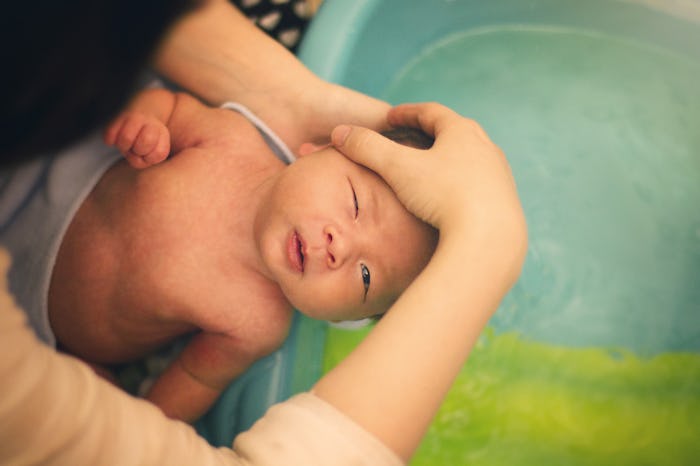Life
How To Treat Your Baby's Dry Skin, According To A Pediatrician
While snuggling and nuzzling your new baby, you may have noticed some flaking happening on their sweet little head or face, or even some dry, red spots. We all know dry skin is pretty uncomfortable for us, but can you imagine how it must feel to a brand new baby with brand new sensitive skin? If your baby is suffering from dryness, you may be wondering how to treat your baby's dry skin. Can you use your handy Lush lotions? Are there any lotions that are unsafe for babies? What is causing their skin to be dry anyway?
Dr. Gina Posner, a pediatrician at MemorialCare Orange Coast Medical Center in Fountain Valley, California, recommends using mild, fragrance-free body washes for babies with dry skin. “Odor- and dye-free detergents can help prevent any allergic skin reactions. Besides that, I have some parents that will use coconut oil or a more natural brand like Burt’s Bees, Honest Kids, or Babyganics lotion,” if you’re looking to go for a more natural route of skincare products for your baby.
Other OTC lotions and creams Posner recommends include thick, odor-free lotions like Cetaphil, Aquaphor, Eucerin, Vanicream, Cerave, or Lubriderm, if your baby has particularly dry skin. Most of these brands create a “baby-friendly” version for you to use, so you don’t necessarily have to or need to use your own supply. All of the baby-friendly versions have less harsh ingredients to protect your baby’s sensitive, brand new skin. Plus, Vanicream makes a diaper rash ointment, as well.
What causes dry skin in babies anyway, and is there anything you can do to prevent it? Posner says that simply some babies and children are born with eczema, and their skin is just dry from that. For others, their environment is dry. As for prevention, regularly applying lotion prevents dryness.
According to the Mayo Clinic, “Eczema is related to a gene variation that affects the skin’s ability to provide protection” from bacteria and other allergens and irritants — which is what healthy skin is supposed to do. And sometimes, food allergies are the cause of eczema in children. If you see dry, red, or brownish-gray patches on your baby’s face and scalp, and their skin looks thicker and scaly, they may have eczema. Children and adults typically get outbreaks on their feet, hands, ankles, wrists, necks, upper chests, inside of the pits of elbows and knees, and even eyelids, according to the Mayo Clinic.
Unfortunately, there’s no cure for eczema, but it is quite treatable. The Mayo Clinic recommended moisturizing the skin twice a day, taking shorter baths or showers, avoiding harsh soaps and detergents, and patting yourself or your baby dry and moisturizing the skin while it’s still damp.
When should you seek medical attention? Posner says, “If [your baby is] having really red and itchy areas or any weepy looking skin, I would have them come in. Also, if any signs of infection like swelling or pus are happening, definitely see your pediatrician.” Additionally, the Mayo Clinic noted if your baby is still experiencing symptoms, even after you’ve tried to treat them at home, your baby has yellow scabs or red streaks, or if it’s affecting your baby’s sleep and other activities, you should see a pediatrician.
Typically, babies don’t get eczema unless there’s a family history of it, and it’s usually just dry skin. After being inside the womb floating around in that amniotic fluid, it’s understandable their skin may react to the outside air, right? And while it’s not necessarily curable, eczema in babies is very treatable by developing specific bathing and moisturizing routines and staying away from harsh products. And if your baby has dry skin from their environment, simply moisturizing with the above baby-safe lotions and maybe even an evaporative style humidifier for your home.
Check out Romper's new video series, Romper's Doula Diaries:
Watch full episodes of Romper's Doula Diaries on Facebook Watch.
